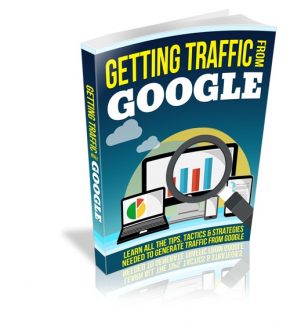 License Type: Resell Rights
License Type: Resell Rights  File Type: ZIP
File Type: ZIP
 SKU: 62096
SKU: 62096  Shipping: Online Download
Shipping: Online Download
Sample Content Preview
Introduction
Many P.C. users depend on Google internet searching to obtain the information they require. One benefit of utilizing Google for your research is that it can gather relevant data from the Web in double quick time. Also, launching a search on Google is easy. A basic Google search will scour the internet for details that are related to the search term(s) you entered. Google also has many additional products and tools available on its website that can assist with the streamlining of a users' searching.
Numerous industries have invested heavily in, and profited from, Google marketing. Some of these were initially 'bricks and mortar' companies like music, publishing, gambling or automotive, whereas others just sprang up as solely online companies, like digital media and design, internet service hosting and blogging.
In 2008, candidates for the U.S.A. Presidency heavily depended on Google marketing techniques to connect with potential voters. Throughout the primaries of 2007, candidates gained, on average, more than five hundred social network followers every day to assist in spreading their political message. President Barack Obama managed to raise over one million dollars in just one day of his Democratic candidacy campaign - and this was due largely to online donors.
In this ebook, we are going to look at Google in greater detail and outline some traffic generating techniques that have been proven to work. By the time you have finished reading this ebook, you should (hopefully) have a much clearer idea about the overall dynamics and process of web marketing.
We will also aim to show you how what you do with your website and business online can dramatically affect the exposure you will get and, ultimately, the profits you will make.
Chapter 1: What Is Google And How Does It Search?
Google is really a multi-national, publicly traded company built round the company's hugely popular internet search engine.
Google's roots return to 1995 when 2 college students, Larry Page and Sergey Brin, met each other at the University of Stanford and collaborated on an investigation project which was to, in the course of time, get to be the Google internet search engine. BackRub, (as it was known then due to its analysis of backlinks), stimulated curiosity about the college research work, but didn't win any bids from the main portal vendors.
Undaunted, the founders gathered up sufficient funding to start and, in September of 1998, began operations from the garage-located office in the Menlo Park area of California. In the same year, PC Magazine put Google in its Top one hundred Internet sites and SE's for 1998.
Google got chosen because of its similarity to the term googol -- a particular number comprising a number 1 followed by one hundred zeroes -- referring to the vast quantity of information on the planet. Google's self-stated mission: "to organize the world's information and make it universally accessible and useful."
In the very first couple of years of trading, Google's internet search engine competition included AltaVista, Excite, Lycos and Yahoo. Within a couple of years, though, Google became so much more popular that its name has turned into a verb for conducting a Web search; individuals are as prone to say they "Googled" some information as they are to say they looked for it.
Whenever you take a seat at your pc and perform a Google search, you're very quickly given a summary of results from all around the web. So how exactly does Google locate webpages that match your search query, and decide the order the search engine results are shown in?
The 3 main aspects to providing search engine results are: Crawling, Serving and Indexing.
Crawling may be the process through which Googlebot discovers updated and new webpages to be put into its Google index.
Google makes use of a huge group of computers to fetch (or "crawl") vast amounts of pages on line. This program that implements the retrieving is known as Googlebot (also called a bot, spider or robot). Googlebot utilizes algorithmic processes: computer programs decide which websites to crawl and how frequently, and just how many webpages to retrieve from every website.
Google's crawl operation starts with a summary of web site URL's, generated from its previous crawl operations, and supplemented with Site Map data supplied by Web Masters. As Googlebot crawls all these sites, it picks up links on every webpage and adds these to its listing of webpages to crawl. Newly created sites, alterations to current sites, along with dead links are made note of and utilized to update Google's index.
Googlebot assesses every one of the webpages it crawls to be able to compile an enormous index of every word it observes and their position on every page. Additionally, it processes information contained in main content attributes and tags, for example, A.L.T. attributes and Title Tags.
Whenever users enter a search query, Google's computers search their index for corresponding webpages and get back the outcomes they believe would be the most highly relevant to consumers. Relevancy is dependent upon over 200 facets, among that is the PageRank for the confirmed page which we will discuss now.
Chapter 2: What Is Google Page Rank?
Page Rank is really a link assessment algorithm named in tribute to Larry Page. It is utilized by Google's Search engine to ascribe a numbered weighting to every part of hyperlinked document groups, for example, the internet, with the objective of gauging its contextual importance in the set.
The algorithm might be put on any mixture of entities along with reciprocal references and quotations. The numbered weighting that it ascribes to any particular element E is named the Page Rank of E and represented by PR(E).
Page Rank reflects Google's view of the significance of webpages by considering a lot more than five hundred million factors and two billion terms. Webpages that Google thinks are essential pages get a greater Page Rank and may appear towards the top of the search engine results.
Page Rank also considers the significance of every webpage which makes a vote, because votes from some webpages are thought to possess greater value, this provides the linked webpage higher value. Google have always taken a pragmatic method to improve search quality and create helpful products and services, their technology uses the collective intelligence of the net to find out a page's importance.
Obviously, essential pages don't mean anything for you when they don't fit your query. Therefore, Google combines Page Rank with highly developed text matching processes to locate webpages which are both essential and highly relevant to a search. Google also looks at the amount of times a term appears on a full page and examines all facets of the page's content (and content on the webpages linking to it) to find out if it's a great match for the query.
A Page Rank results from the mathematical algorithm in line with the graph, the webgraph, developed by all Internet pages as nodes and hyperlinks as edges, considering authority hubs, for example, cnn.com or usa.gov. The value of the rank represents the importance of that particular webpage. A hyperlink to a page counts as a vote of support.
The Page Rank of a full page is defined recursively and depends upon the amount and Page Rank metric of pages that connect to it ("incoming links"). A full page that's associated with many pages with high Page Ranks receives a higher rank it self. If you find no links to a web site then there is absolutely no support for that page.
Page Rank is really a probability distribution utilized to indicate the chance that the person randomly hitting links will get to any given webpage. Page Rank could be calculated for collections of documents of any size. Many research papers assume that this distribution is divided evenly among all the documents in a collection when Google begins its computational process.
The Page Rank computations require a few passes, called "iterations", via the collection, for amending the estimated Page Rank values to reflect more accurately their true value.
Google works since it depends on an incredible number of individuals posting links online to greatly help determine which other websites offer content of value.
This method actually improves while the web gets bigger, as each new site is yet another point of information and yet another vote to be counted.
PageRank is essential, although, not the only element in how pages are ranked. That's good, because a lot of folks have fixated on Page Rank scores for too much time.
- License: Resell Rights
- Category:Ebooks
- Tags:2018 Ebooks Resale Rights








